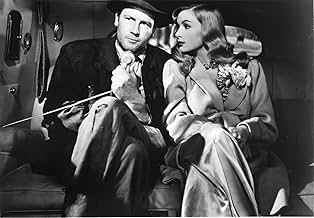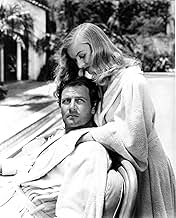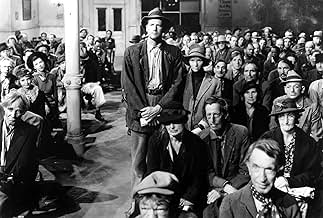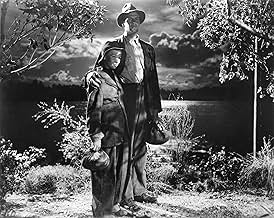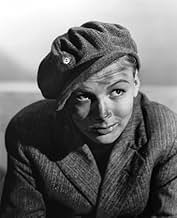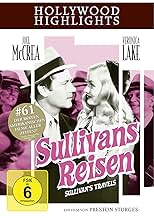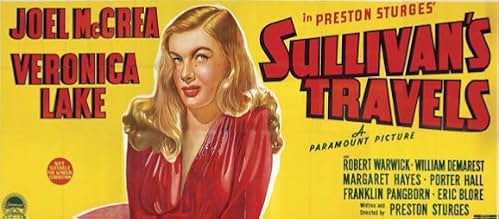Hollywood director John L. Sullivan sets out to experience life as a homeless person in order to gain relevant life experience for his next movie.Hollywood director John L. Sullivan sets out to experience life as a homeless person in order to gain relevant life experience for his next movie.Hollywood director John L. Sullivan sets out to experience life as a homeless person in order to gain relevant life experience for his next movie.
- Awards
- 2 wins total
Charles R. Moore
- Colored Chef
- (as Charles Moore)
- Director
- Writer
- All cast & crew
- Production, box office & more at IMDbPro
Featured reviews
No need to add to the praise others have justly given this classic, but there's one thing I think is especially clever about the plot (without giving too much of it away). The apparent moral of this Depression-era movie is that bad as conditions may be, audiences don't need to be reminded about them, instead needing escapist fare to distract them from the world's problems. Meanwhile, after setting you up to relax and enjoy a screwball comedy, Sturges succeeds in surreptitiously drawing you into just the kind of bleak "social consciousness" movie his characters are saying is impossible to get people to watch, without your realizing it at the time. Well, without my realizing it, anyway, until much later.
Preston Sturges (1898-1959) wrote over 40 film screenplays spanning the years 1930-1958 and directed over a dozen films 1940-1955. His first attempt at directing was a success with a string of two popularly and critically acclaimed films in each of the years 1940 and 1941, "The Great McGinty", "Christmas in July"; "The Lady Eve" (starring Henry Fonda and Barbara Stanwyck), and this film, "Sullivan's Travels".
The beauty of "Sullivan's Travels" is the combination in genre of comedy as well as social satire and realism of the tough times of the Great Depression that the country had just weathered for a decade. Throw a romance in to the mix and a level of redirection of a "film on film" to make this an interesting film.
John Sullivan (Joel McCrea) is a famous director who is at odds with his production company. They want him to direct a comic film, while he wants to apply his talent to creating an analytic looking glass onto the sobering times called, "O Brother, Where Art Thou?". Wealthy and successful, he is mocked for not at all knowing misfortune - how would he make such a film? John takes this as a challenge, dresses as a hobo, and leaves the studio with a dime in his pocket to explore what life is like for the down and out.
However he tries to flee, he ends up getting somehow quickly being returned to Hollywood. Early on, he meets "the girl" (Veronica Lake; I don't recall her ever being given a name in the film) who sees that he is too innocent to survive on his own, and insists on bringing her broader knowledge of society to the journey and joining him to get him through this learning adventure.
The first part of the film is comic, but just as it seems to be coming to an unfulfilled ending, something unexpected happens. This event alters the course of everything and exposes John to some of the true injustices of the time - and shows him (and poignantly reminded me) that comedy is particularly important when some people have nothing else to cheer them up.
This is a film of classic Hollywood vintage, with good, snappy performances by both of the lead actors. The romance isn't at all developed but just seems to happen in a matter-of-fact way (perhaps we can take it on faith that there is instant chemistry), but what is lacking in psychology of the relationship is made up for in the chilling glimpse we get of the psyche of the underdog in Depression America.
--Dilip Barman June 19, 2004
The beauty of "Sullivan's Travels" is the combination in genre of comedy as well as social satire and realism of the tough times of the Great Depression that the country had just weathered for a decade. Throw a romance in to the mix and a level of redirection of a "film on film" to make this an interesting film.
John Sullivan (Joel McCrea) is a famous director who is at odds with his production company. They want him to direct a comic film, while he wants to apply his talent to creating an analytic looking glass onto the sobering times called, "O Brother, Where Art Thou?". Wealthy and successful, he is mocked for not at all knowing misfortune - how would he make such a film? John takes this as a challenge, dresses as a hobo, and leaves the studio with a dime in his pocket to explore what life is like for the down and out.
However he tries to flee, he ends up getting somehow quickly being returned to Hollywood. Early on, he meets "the girl" (Veronica Lake; I don't recall her ever being given a name in the film) who sees that he is too innocent to survive on his own, and insists on bringing her broader knowledge of society to the journey and joining him to get him through this learning adventure.
The first part of the film is comic, but just as it seems to be coming to an unfulfilled ending, something unexpected happens. This event alters the course of everything and exposes John to some of the true injustices of the time - and shows him (and poignantly reminded me) that comedy is particularly important when some people have nothing else to cheer them up.
This is a film of classic Hollywood vintage, with good, snappy performances by both of the lead actors. The romance isn't at all developed but just seems to happen in a matter-of-fact way (perhaps we can take it on faith that there is instant chemistry), but what is lacking in psychology of the relationship is made up for in the chilling glimpse we get of the psyche of the underdog in Depression America.
--Dilip Barman June 19, 2004
In Hollywood, the spoiled director of humdrum movies, John Lloyd Sullivan (Joel McCrea), was born in silver spoon but is very successful with his superficial comedies. Out of the blue, he tells to his producer Mr. LeBrand (Robert Warwick) that he wants to make serious dramas, like "O Brother, Where Art Thou?" and he will live like a tramp on the streets to learn the sorrows of great part of the population. He wears cheap clothes and tries to blend with poor people but he always returns to Hollywood protected by the safety team hired by the studio.
One day, he goes to a dinner with a coin and a blonde girl (Veronica Lake) offers bacon and eggs to him. Soon he learns that the girl is a failed actress that had never a chance in Hollywood and is returning home hitchhiking without any money. Sullivan decides to retribute her kindness giving a ride to her in his car but they are arrested by the police. When they are released, the girl decides to join Sullivan in his quest to learn about poverty. When Sullivan is satisfied, he is robbed and dumped unconscious in a train. He awakes in the countryside where there is an incident and he is arrested and sentenced to a labor camp, where he leans the importance of comedy in the miserable lives of destitute people.
"Sullivan's Travels" is a delightful movie by Preston Sturges with a satire of Hollywood lifestyle and the importance of comedy in the life of people, a relief for a couple of minutes for those that do not have other sort of entertainment. Joel McCrea is very funny in the role of a naive director trying to find how the poor people live. His chemistry with the gorgeous Veronika Lake is perfect and this was the first time that I noted that this lovely actress was only 1.51 m height. My vote is eight.
Title (Brazil): "Contrastes Humanos" ("Human Contrasts")
One day, he goes to a dinner with a coin and a blonde girl (Veronica Lake) offers bacon and eggs to him. Soon he learns that the girl is a failed actress that had never a chance in Hollywood and is returning home hitchhiking without any money. Sullivan decides to retribute her kindness giving a ride to her in his car but they are arrested by the police. When they are released, the girl decides to join Sullivan in his quest to learn about poverty. When Sullivan is satisfied, he is robbed and dumped unconscious in a train. He awakes in the countryside where there is an incident and he is arrested and sentenced to a labor camp, where he leans the importance of comedy in the miserable lives of destitute people.
"Sullivan's Travels" is a delightful movie by Preston Sturges with a satire of Hollywood lifestyle and the importance of comedy in the life of people, a relief for a couple of minutes for those that do not have other sort of entertainment. Joel McCrea is very funny in the role of a naive director trying to find how the poor people live. His chemistry with the gorgeous Veronika Lake is perfect and this was the first time that I noted that this lovely actress was only 1.51 m height. My vote is eight.
Title (Brazil): "Contrastes Humanos" ("Human Contrasts")
Sturges' most daringly double-edged film, laced with bitter ironies. It is also arguably the most audacious film in Hollywood's (mainstream) history, audacious because it takes the kinds of risks that can so easily fall flat on their face, and right until the final image, as Sturges becomes increasingly ambitious and multi-layered, you wonder how long he can keep it up without getting ridiculous. It never does, but the film is so full of contradictions, tensions, suppressions, clanging lurches in tone - 'Travels' is ostensibly a comedy, and one of Hollywood's best, but the last twenty minutes are truly painful to watch, harrowing and not at all funny.
The overriding source of tension, of course, is the film itself, the plot, and the emotions that are supposed to be elicited. It is very difficult, and frequently impossible to gauge the tone of any one scene. Sometimes this is straightforward, as when information is deliberately withheld from the audience, it is asked to make a judgement, and then shown to be wrong, as in the scenes where the studio moguls claim a background of deprivation (which is historically plausible). This kind of comedy is familiar enough.
But what about the later montage of Sullivan and the Girl experiencing the 'reality' of poverty - are these scenes supposed to be genuine representation of poverty? Are they part of a wider satire on pious films like 'Grapes of Wrath', which dubiously aestheticise poverty - there are a lot of Expressionistic flourishes in this sequence? Are they a kind of abstract purgatory through which Sullivan finds spiritual understanding?
There is a big difference between the representation of poverty in this sequence and the one where Sullivan is attacked and sent to prison. But is one more 'authentic' than the other - the second one bravely rejects the view of 'noble' poverty, shows how it dehumanises people, turns them instinctual and brutal; but it also provides a neat moral, which suggests that if you do somebody wrong, you will be (horribly) punished for it. This realism, therefore, is as contrived as the first. Is this Sturges' point, that the good intentions of realism are always tainted by ideological assumptions, patronising good-will, or motives of elevation. This sense of artifice, of a film comprised of varying self-reflexive modes rather than a plausible narrative, runs through 'Travels', with characters talking about the film they're in as a plot - in direst danger, Sullivan acknowledges the need for a helluva twist which duly arrives, filmed in silent slapstick with barely concealed Sturges contempt (and did his friends seem terribly put out by his death?).
This would seem to uphold 'Travels'' ostensible theme, its celebration of comedy as a sugar with which to sweeten the harshness of reality. This is a very cynical view of comedy, and a highly manipulative, conservative one - distract an unhappy populace from the injustice of their lives. The best comedies - from 'Sherlock Jr' and 'Modern Times' to 'Playtime' and 'The Discreet Charm of the Bourgeoisie' have always been about real life, encouraging their viewers to think harder about the society they live in, much more effectively than so-called naturalism.
'Travels' is no exception. It might be a celebration of comedy, but this is comedy a million miles from 'Ants in your Pants'. What other 40s film still manages to show the brutality of poverty, of the prison system, of race relations, the fate of young women in sexually voracious Hollywood (the Girl's ease with her body in the swimming pool scene speaks volumes), however we choose to read them? When Sullivan's determination at the end to continue making populist comedies is endorsed by the ringing laughter of the world's meek and suffering, the disjunction is grotesque. This is a man, on an airplane, completely removed from reality, surrounded by wealthy toadies. Those happy laughs could so easily be contemptuous guffaws, because what Sullivan wants to do, and Sturges hasn't, is hide the inequalities of capitalism, the system on which Hollywood thrives, and the flaws in which they would be only too happy to cover up with inanity. But to even suggest this is to fall into the 'Capra' trap mocked at the beginning.
This difficulty is what makes 'Travels' such a stunningly modern film - its shifts from sophisticated verbal wit to elaborate slapstick to blatant Carry On-like innuendo (the matronly sister dusting the bedpost after seeing a sweating, shirtless Sullivan work) to tragedy to hallucination and dream to satire foreshadows Melville and the New Wave, while the privileged rich man who cannot escape Hollywood would transmute into the guests who can't leave the house, or can't get dinner in later Bunuel films; or the film that begins with an end. The opening sequence takes off 'Citizen Kane'. The deadpan genderplay is quietly gobsmacking, and Veronica Lake as a (gorgeous) tramp would be alluded to by Jeanne Moreau in 'Jules et JIm'. But the joys are all Sturges', as he democratises comedy (see again that swimming pool sequence); I love in particular those glorious supporting actors: my favourite being the immortal Eric Blore and Robert Greig as Sullivan's servants.
The overriding source of tension, of course, is the film itself, the plot, and the emotions that are supposed to be elicited. It is very difficult, and frequently impossible to gauge the tone of any one scene. Sometimes this is straightforward, as when information is deliberately withheld from the audience, it is asked to make a judgement, and then shown to be wrong, as in the scenes where the studio moguls claim a background of deprivation (which is historically plausible). This kind of comedy is familiar enough.
But what about the later montage of Sullivan and the Girl experiencing the 'reality' of poverty - are these scenes supposed to be genuine representation of poverty? Are they part of a wider satire on pious films like 'Grapes of Wrath', which dubiously aestheticise poverty - there are a lot of Expressionistic flourishes in this sequence? Are they a kind of abstract purgatory through which Sullivan finds spiritual understanding?
There is a big difference between the representation of poverty in this sequence and the one where Sullivan is attacked and sent to prison. But is one more 'authentic' than the other - the second one bravely rejects the view of 'noble' poverty, shows how it dehumanises people, turns them instinctual and brutal; but it also provides a neat moral, which suggests that if you do somebody wrong, you will be (horribly) punished for it. This realism, therefore, is as contrived as the first. Is this Sturges' point, that the good intentions of realism are always tainted by ideological assumptions, patronising good-will, or motives of elevation. This sense of artifice, of a film comprised of varying self-reflexive modes rather than a plausible narrative, runs through 'Travels', with characters talking about the film they're in as a plot - in direst danger, Sullivan acknowledges the need for a helluva twist which duly arrives, filmed in silent slapstick with barely concealed Sturges contempt (and did his friends seem terribly put out by his death?).
This would seem to uphold 'Travels'' ostensible theme, its celebration of comedy as a sugar with which to sweeten the harshness of reality. This is a very cynical view of comedy, and a highly manipulative, conservative one - distract an unhappy populace from the injustice of their lives. The best comedies - from 'Sherlock Jr' and 'Modern Times' to 'Playtime' and 'The Discreet Charm of the Bourgeoisie' have always been about real life, encouraging their viewers to think harder about the society they live in, much more effectively than so-called naturalism.
'Travels' is no exception. It might be a celebration of comedy, but this is comedy a million miles from 'Ants in your Pants'. What other 40s film still manages to show the brutality of poverty, of the prison system, of race relations, the fate of young women in sexually voracious Hollywood (the Girl's ease with her body in the swimming pool scene speaks volumes), however we choose to read them? When Sullivan's determination at the end to continue making populist comedies is endorsed by the ringing laughter of the world's meek and suffering, the disjunction is grotesque. This is a man, on an airplane, completely removed from reality, surrounded by wealthy toadies. Those happy laughs could so easily be contemptuous guffaws, because what Sullivan wants to do, and Sturges hasn't, is hide the inequalities of capitalism, the system on which Hollywood thrives, and the flaws in which they would be only too happy to cover up with inanity. But to even suggest this is to fall into the 'Capra' trap mocked at the beginning.
This difficulty is what makes 'Travels' such a stunningly modern film - its shifts from sophisticated verbal wit to elaborate slapstick to blatant Carry On-like innuendo (the matronly sister dusting the bedpost after seeing a sweating, shirtless Sullivan work) to tragedy to hallucination and dream to satire foreshadows Melville and the New Wave, while the privileged rich man who cannot escape Hollywood would transmute into the guests who can't leave the house, or can't get dinner in later Bunuel films; or the film that begins with an end. The opening sequence takes off 'Citizen Kane'. The deadpan genderplay is quietly gobsmacking, and Veronica Lake as a (gorgeous) tramp would be alluded to by Jeanne Moreau in 'Jules et JIm'. But the joys are all Sturges', as he democratises comedy (see again that swimming pool sequence); I love in particular those glorious supporting actors: my favourite being the immortal Eric Blore and Robert Greig as Sullivan's servants.
After the opening credits, the film opens with the following statement.
"To the memory of those who made us laugh: the motley mountebanks, the clowns, the buffoons, in all times and in all nations whose efforts have lightened our burden a little, this picture is affectionately dedicated."
With this film, Preston Sturges made one of the smartest and most insightful comedies ever to come out of Hollywood, in which he especially held up the mirror to Tinseltown itself. A Hollywood variation on Gulliver's Travels, it's the tale of Hollywood director John Sullivan (Joel McCrea), tired of making Hollywood Fluff, who wants to branch out with a socially conscious epic, called "O Brother, Where Art Thou", and sets out to research the meaning of poverty. His studio bosses (very funny roles by Robert Warwick and Porter Hall) try to tell him it's a ridiculous idea but Sullivan insists, puts on some hobo clothes and sets out to see what it's like to experience poverty and suffering. The studio soon sees it as potential publicity stunt and sent an entire crew to follow him around during his trip.
Some very enjoyable references to socially conscious movie-making, to Ernst Lubitch in particular, make this particularly fun with some knowledge of the period and the films mentioned, albeit not necessary. And almost worth seeing alone for Veronica Lake's memorable performance as a failed starlet.
According to Sturges, the film did contain a little "message":
"SULLIVAN'S TRAVELS is the result of an urge, an urge to tell some of my fellow filmwrights that they were getting a little too deep-dish and to leave the preaching to the preachers."
By any means, he made a uniquely self-reflective comedy about Hollywood with wonderful characterizations and superlative performances. A brilliant satire with a "message" just as poignant as ever.
Camera Obscura --- 9/10
"To the memory of those who made us laugh: the motley mountebanks, the clowns, the buffoons, in all times and in all nations whose efforts have lightened our burden a little, this picture is affectionately dedicated."
With this film, Preston Sturges made one of the smartest and most insightful comedies ever to come out of Hollywood, in which he especially held up the mirror to Tinseltown itself. A Hollywood variation on Gulliver's Travels, it's the tale of Hollywood director John Sullivan (Joel McCrea), tired of making Hollywood Fluff, who wants to branch out with a socially conscious epic, called "O Brother, Where Art Thou", and sets out to research the meaning of poverty. His studio bosses (very funny roles by Robert Warwick and Porter Hall) try to tell him it's a ridiculous idea but Sullivan insists, puts on some hobo clothes and sets out to see what it's like to experience poverty and suffering. The studio soon sees it as potential publicity stunt and sent an entire crew to follow him around during his trip.
Some very enjoyable references to socially conscious movie-making, to Ernst Lubitch in particular, make this particularly fun with some knowledge of the period and the films mentioned, albeit not necessary. And almost worth seeing alone for Veronica Lake's memorable performance as a failed starlet.
According to Sturges, the film did contain a little "message":
"SULLIVAN'S TRAVELS is the result of an urge, an urge to tell some of my fellow filmwrights that they were getting a little too deep-dish and to leave the preaching to the preachers."
By any means, he made a uniquely self-reflective comedy about Hollywood with wonderful characterizations and superlative performances. A brilliant satire with a "message" just as poignant as ever.
Camera Obscura --- 9/10
Storyline
Did you know
- TriviaCinematographer John Seitz admired Preston Sturges' unconventional approach to his work. The opening scene comprised ten pages of dialogue to cover about four and a half minutes of screen time. It was scheduled for two complete days of shooting. On the morning of the first day, Seitz found Sturges inspecting the set with a viewfinder, looking for where he could cut the scene and change camera set-ups. Seitz dared him to do it all in one take. Never one to refuse a dare, Sturges took him up on it, although the nervous Seitz had never attempted to complete a two-day work schedule in one day. With the endorsement of McCrea and the rest of the actors, Sturges pressed on, determined to set a record. The first take was fine, but the camera wobbled a little in the tracking shot following the men from screening room to office, so they tried again. They did two or three takes at the most and that was it - two full days work by 11 a.m. on the first day, a feat that had the entire studio buzzing.
- GoofsWhen Sullivan and the Girl jump off the train and walk to the lunch stand, nothing is visible around the outside of the lunch stand--not a car, tree or anything. When Sullivan asks if the proprietor had seen a land yacht (a big RV), the proprietor points to the side and they look out the window and see the big land yacht parked there. Of course, if it had been there in the first place, Sullivan would have seen it right away and not gone into the lunch stand.
- Quotes
[last lines]
John L. Sullivan: There's a lot to be said for making people laugh. Did you know that that's all some people have? It isn't much, but it's better than nothing in this cockeyed caravan.
- Crazy creditsThe Paramount logo appears as a seal on a package.
The package is opened to reveal a book with the film title on it and the opening credits appear on pages in the book.
- ConnectionsFeatured in The Cinematographer (1951)
- SoundtracksSpring Song
(1844) (uncredited)
Written by Felix Mendelssohn
Played as part of the score when Sullivan starts his experiment
Reprised when he starts a second time
Details
Box office
- Budget
- $689,665 (estimated)
- Gross worldwide
- $10,272
- Runtime1 hour 30 minutes
- Color
- Aspect ratio
- 1.37 : 1
Contribute to this page
Suggest an edit or add missing content



